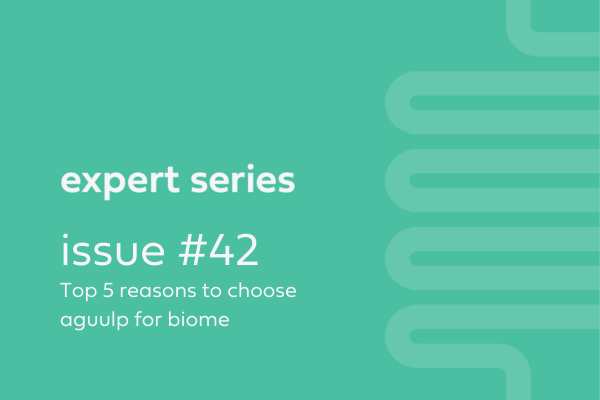Understanding Diverticular Disease (Including Diverticulitis Supplements, Causes & Symptoms)
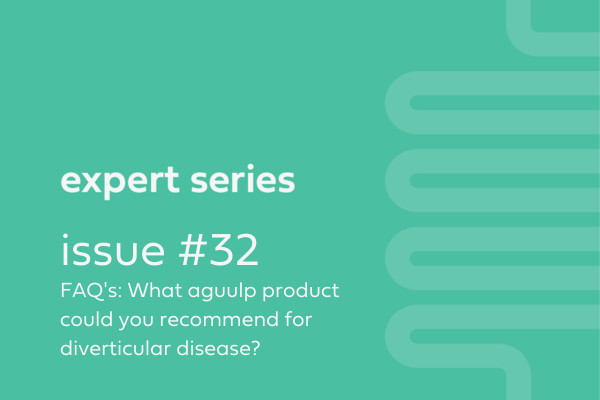
Every month, we’re inundated with questions from customers on everything from gut health to chronic fatigue and our team of experts are always on-hand to help with informative, expert-led answers.
This time, we’re going to look at what you need to know about diverticular disease and diverticulitis, exploring everything from diverticular disease symptoms to what diverticulitis supplements are available. what it is, what causes it and our tips on how to help manage symptoms. If you’ve got a burning question to ask, head to the bottom of the page to send your questions in – yours might just be the next one featured.
Question: I have diverticulitis disease. I did have a colostomy bag for a period of 10 months, then the operation was reversed so I’m back to normal now but I suffer from constipation. I’ve been looking for supplements for diverticulitis. What aguulp product could you recommend?
What is diverticular disease?
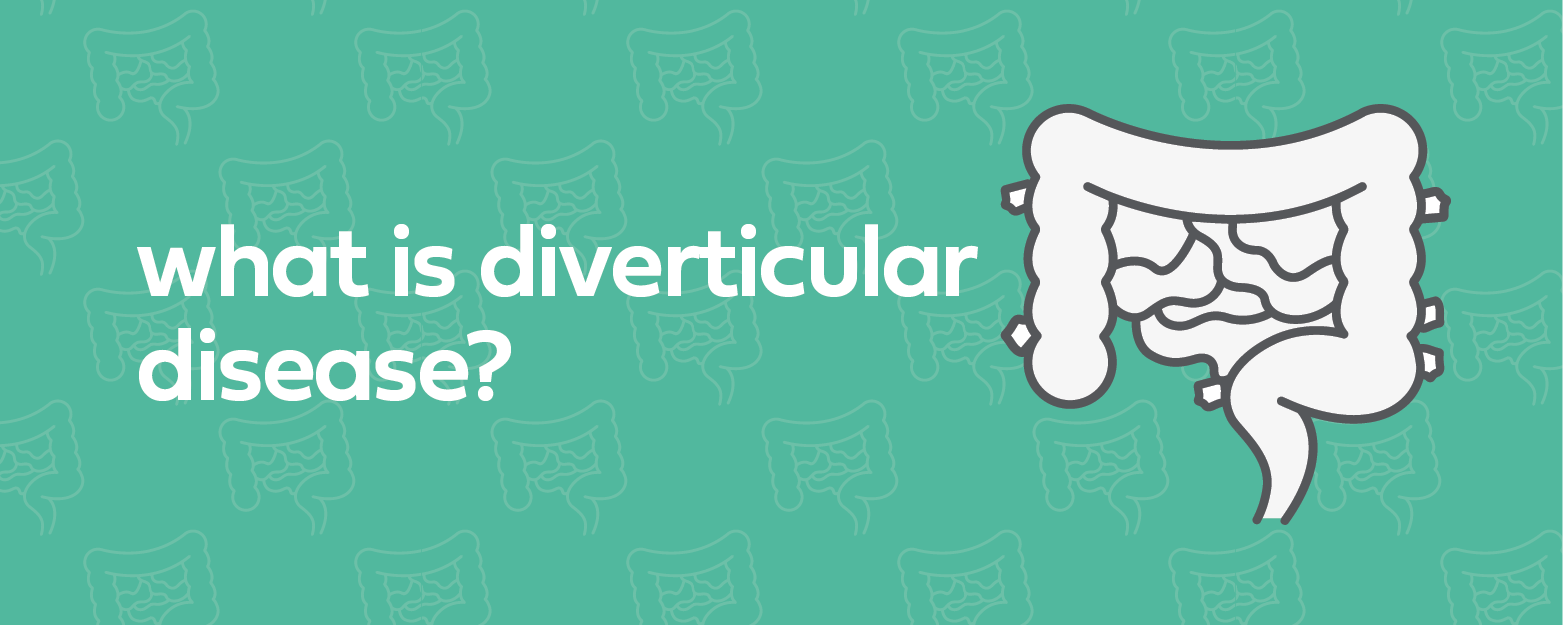
Diverticular disease consists of three conditions that involve the development of small sacs or pockets (known as diverticula) in the wall of the colon. These three conditions are: diverticulosis, diverticular bleeding, and diverticulitis.
Diverticula are small, bulging pouches that can form in the lining of your digestive system. They can range from pea-size to much larger and are formed by increased pressure on weakened spots of the intestinal walls by gas, waste, or liquid. Diverticula can form while straining during a bowel movement, such as with constipation. They are most common in the lower portion of the large intestine (called the sigmoid colon). The pouches generally aren’t harmful, however there are cases where they can become a problem. Complications can occur with diverticular disease in about 20% of people. One of these complications is rectal bleeding, called diverticular bleeding, and another is diverticular infection, called diverticulitis. These are the most common conditions that can develop with the disease.
What is diverticulitis?
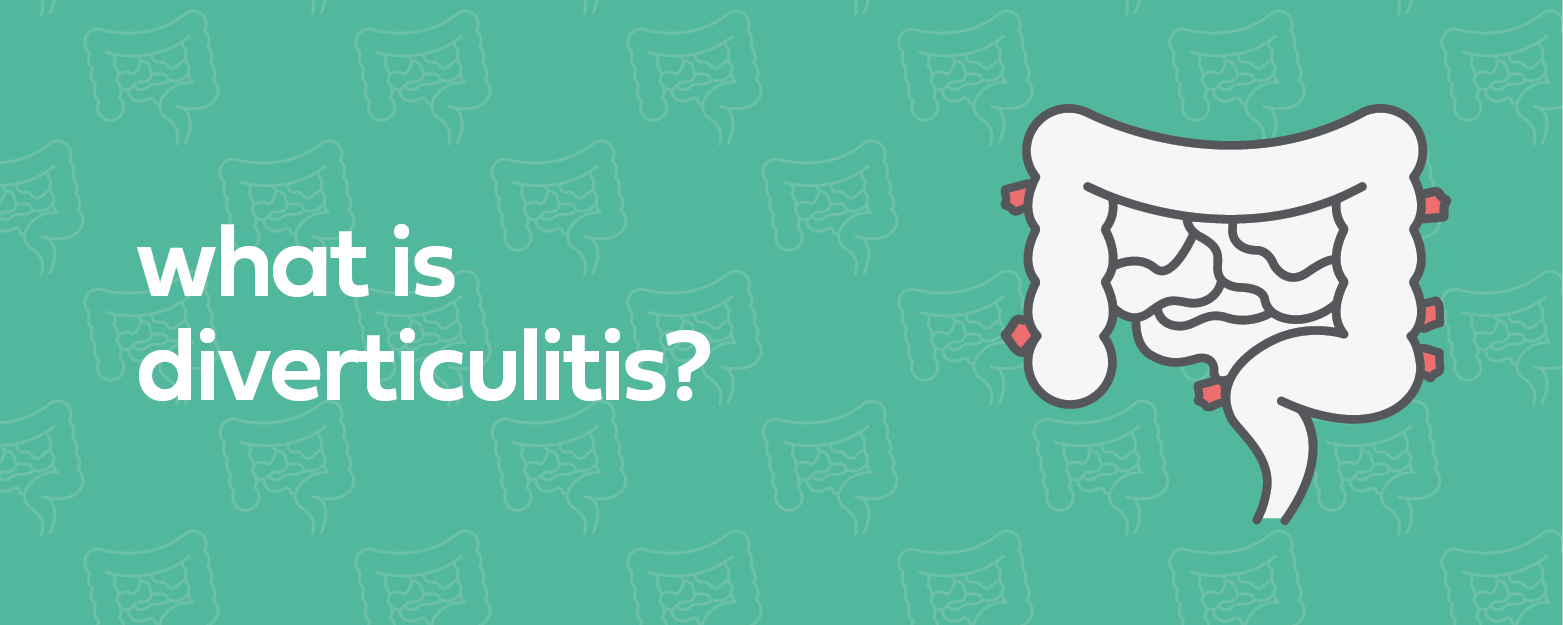
As mentioned, diverticular disease involves the formation of diverticula in the lining of the digestive system. When the diverticula becomes infected or inflamed, this condition is called diverticulitis. This usually happens when the pouches become blocked or irritated with waste, allowing bacteria to build up, causing infection.
Sometimes, diverticulitis is minor, but it can also be severe, leading to a massive infection or perforation (rupture) of the bowel.
Diverticular disease symptoms:
Diverticular disease symptoms can vary, ranging from uncomplicated symptoms, such as pain or mild diverticulitis, to potentially life-threatening complications, such as abscess, perforation (hole), or haemorrhage (bleeding).
Diverticular disease symptoms can include the following:
- bloating
- constipation and/or diarrhoea
- cramping or pain in the lower abdomen
- other conditions, such as irritable bowel syndrome, cause similar symptoms, so having these symptoms may not mean you have diverticular disease.
Diverticulitis symptoms:
Diverticulitis is the most common complication of diverticular disease, affecting between 1 in 10 to a quarter of people with the condition. The current theory is that the inflammation and/or infection occurs because of an overgrowth of bacteria in the diverticula.
Symptoms of diverticulitis include:
- worsening abdominal pain
- high temperature/chills
- nausea (feeling sick) or vomiting
If you experience any of these symptoms, medical help should be sought immediately.
What causes diverticular disease & diverticulitis?
The exact causes of diverticular disease and the conditions associated to it are still uncertain. With research growing around the disease, the following factors are considered to be potential causes to the formation of pouches (diverticula), in the digestive system:
- Age: After the age of 40, diverticular disease becomes more common, however in recent years, more people under 45 years of age are being diagnosed.
- Diet: Research has shown that diet and an unhealthy high body weight can be linked to diverticular disease. Poor diet choices such as low fibre intake haves been shown to be related to developing diverticular disease.
- Changes in the gut microbiome: Researchers have been studying the microorganisms present in our gut to understand their role in digestive disorders. Although studies have been limited, the studies that have been conducted have found higher levels of a particular type of bacteria (Bifidobacterium) in patients with diverticulitis in particular, suggesting it may be one of the causes of diverticulitis.
Other potential causes of diverticulitis may include:
- decreased immune function
- obesity
- physical inactivity
- smoking
- certain medications, such as steroids
Treatment for diverticulitis & diverticular disease: what are the options?
The most appropriate treatment for diverticulitis and diverticular disease can vary depending on the severity of cases. It is important to bear in mind that the tips below are recommended for those with mild diverticular disease/diverticulitis. Severe or recurring diverticulitis may require surgery.
As straining can be one of the known causes of the formation of diverticula within the digestive system, a high-fibre diet is recommended to keep your bowels regular. A healthy, balanced diet is recommend, featuring high-fibre foods such as:
- whole grains
- brown rice
- fruits
- vegetables
- nuts and seeds
- legumes: lentils, beans, chickpeas
These foods will not only improve and ease digestion, but will also help alleviate symptoms of constipation.
A diet low in fat and sugar can also be recommended to help make the stool softer and easier to pass through the bowels. Lowering the intake of fat and sugars may also allow food to move through the digestive tract quicker and with fewer complications.
Water: is also important for the fibre to have a positive effect on bowel movements. You should aim for 2L per day (increasing gradually up to this amount if you currently don’t consume this level of water per day).
Chewing food slowly: and thoroughly to ensure food molecules are broken down efficiently, ready for optimal digestion and absorption is also important.
Exercise: research shows that moderate physical activity has positive effects on the health of the gastrointestinal tract and individuals who are physically active have a lower prevalence of constipation
Probiotic supplements for diverticular disease and diverticulitis
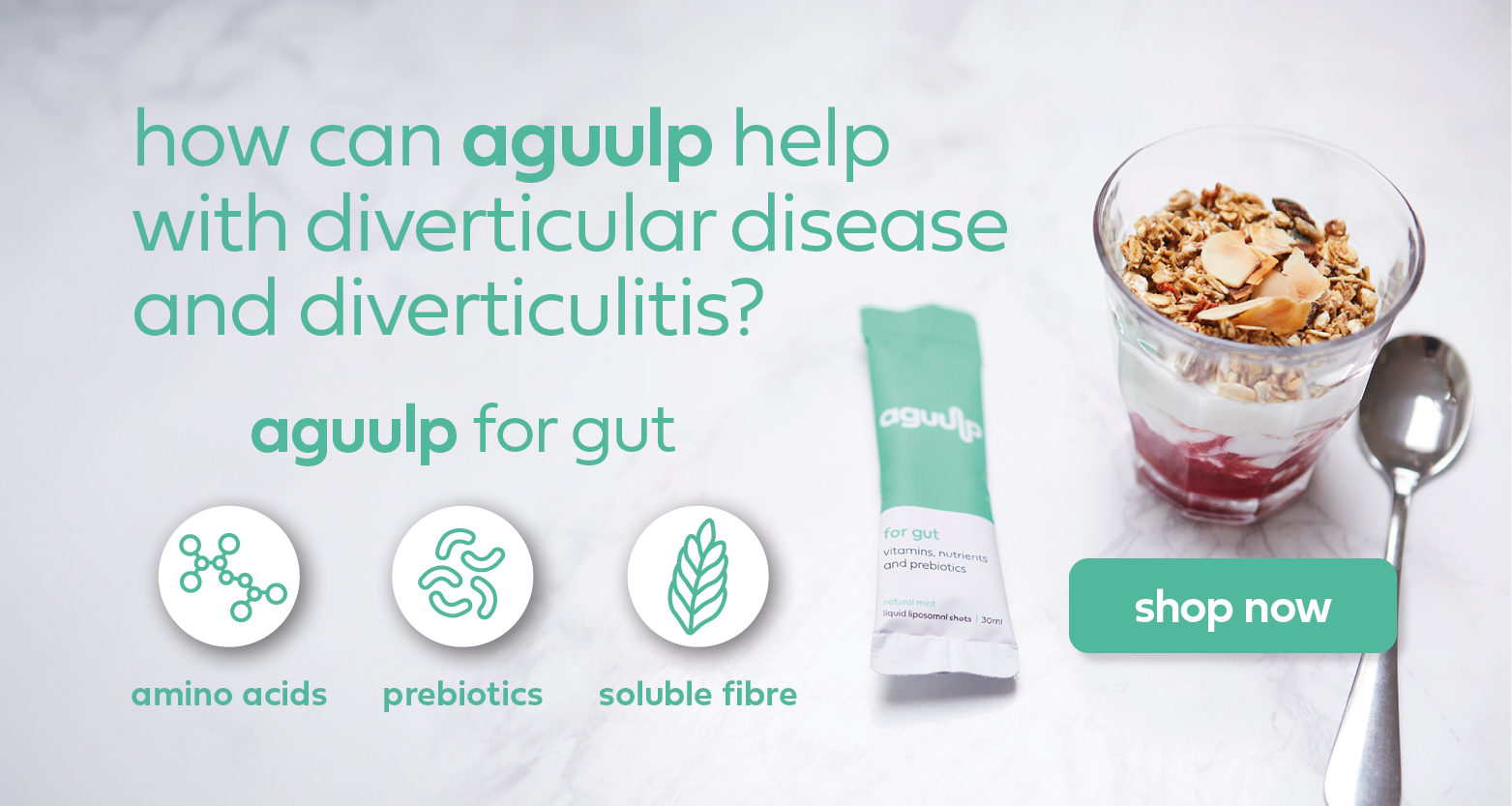
Research shows that probiotics may help reduce or improve symptoms of diverticular disease and diverticulitis. This is because bacteria in the gut attach themselves to the mucus layer of the intestinal barrier and having the right types of beneficial gut bacteria can help to support gut integrity. This means that probiotics may make effective supplements for diverticulitis, but you should always speak to your GP before trying anything new as a treatment for diverticulitis.
Healthy gut bacteria also help keep the gut environment healthy by regulating immunity and inflammation in the intestines. When beneficial bacteria is lacking, this allows for higher levels of disease causing bacteria to proliferate leading to irritation and inflammation in the gut lining.
If you’re looking for probiotic supplements for diverticulitis, we recommend aguulp for biome, an easy-to-take formula that contains both probiotics and prebiotics.
Prebiotic supplements for diverticulitis
Research shows that probiotics may help reduce or improve symptoms of Diverticular disease and diverticulitis. This is because bacteria in the gut attach themselves to the mucus layer of the intestinal barrier and having the right types of beneficial gut bacteria can help to support gut integrity.
Healthy gut bacteria also help keep the gut environment healthy by regulating immunity and inflammation in the intestines. When beneficial bacteria is lacking, this allows for higher levels of disease causing bacteria to proliferate leading to irritation and inflammation in the gut lining.
aguulp for gut: prebiotic supplement
Our aguulp for gut prebiotic supplement has been specifically formulated to be used as a maintenance product for overall gut health.If you’re looking for diverticulitis supplements that will help prevent future flare-ups, this could be a good option. The ingredients in this product would be expected to help from an anti-inflammatory perspective as follows:
- L-Glutamine: the most abundant non-essential amino acid in human muscle. L-glutamine has been shown to play a vital role in the health of the digestive system. It is important because it regenerates the cells that line the digestive tract and has been shown to protect against inflammation, improve intestinal barrier function and help to reduce intestinal permeability. Furthermore, research has shown that taking L-glutamine supplements can drastically increase intestinal permeability, improving the intake of vital nutrients, which is particularly important in malabsorption conditions, such as diverticular disease and diverticulitis.
- Collagen: low levels have been associated with inflammatory bowel disease and digestive imbalances. One of the key amino acids in collagen is glutamine, which is believed to help prevent inflammation and play a part in the repair and healing of the gut wall.
- Zinc: encourages healing and reduces gut inflammation. Zinc has also been shown to reduce gut permeability by actively having a positive effect on tight junctions.
- Antioxidants, such as vitamin C, can increase collagen synthesis and can help reduce inflammation.
- Prebiotics: inulin, FOS and XOS act as a food source to healthy bacteria, stimulating the growth of non-pathogenic intestinal microflora and the production of short chain fatty acids which are beneficial to overall gut health.
Inulin in particular is believed to slow overall digestion, which enables the body to absorb more nutrients from food. This is particularly important in malabsorption syndromes, such as diverticular disease and diverticulitis
Whether you’re looking for supplements for diverticulitis, diarrhoea, constipation, or another symptom, aguulp has fast-acting liquid formulas that can help you. Take our gut health test to find out what support you could benefit from.
References:
Author links open overlay panelNimalan Arjun Jeganathan 1 et al. (2021) The microbiome of diverticulitis, Current Opinion in Physiology. Available at: https://www.sciencedirect.com/science/article/abs/pii/S2468867321000778#:~:text=Based%20on%20preliminary%20studies%2C%20akin,tissues%20within%20the%20same%20individual. (Accessed: 26 July 2023).
Diverticular Disease & Bleeding: Causes, symptoms, and treatments (no date) WebMD. Available at: https://www.webmd.com/digestive-disorders/diverticular-disease (Accessed: 25 July 2023).
Diverticular Disease & Diverticulitis: Causes & Symptoms (2023) Guts UK. Available at: https://gutscharity.org.uk/advice-and-information/conditions/diverticular-disease/#section-2 (Accessed: 25 July 2023).
Weizman, A.V. and Nguyen, G.C. (no date) Diverticular disease: Epidemiology and management, Canadian Journal of Gastroenterology and Hepatology. Available at: https://www.hindawi.com/journals/cjgh/2011/795241/ (Accessed: 25 July 2023).

